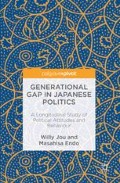Abstract
In recent decades many practitioners, commentators, and scholars of party politics have written on the rise of radical right forces in advanced democracies, but Japan has not featured in this growing literature. This does not mean that extreme right opinions are absent or irrelevant in Japan, however; rather, these ideas have rarely found political expression. One exception was the Tokyo gubernatorial election in 2014, when a candidate known for radical right views garnered a respectable vote share. A survey conducted for this election thus offers a rare opportunity to examine a group of voters that have not been profiled heretofore. Through a comparison of respondents who cast their ballot for the aforementioned candidate and his main rivals, this chapter looks at factors that may distinguish the radical right electorate in Japan, including demographics, dissatisfaction with politics, policy preferences, authoritarian views, nationalism, and anti-foreigner sentiments.
Access this chapter
Tax calculation will be finalised at checkout
Purchases are for personal use only
References
Adorno, Theodor W., Else Frenkel-Brunswick, Daniel J. Levinson, and R. Nevitt Sanford. 1950. The Authoritarian Personality. New York: Harper.
Altmeyer, Bob. 1996. The Authoritarian Specter. Cambridge: Harvard University Press.
Baimbridge, Mark, Brian Burkitt, and Marie Macey. 1994. The Maastricht Treaty: Exacerbating racism in Europe? Ethnic and Racial Studies 17(3): 420–441.
Betz, Hans-Georg. 1994. Radical Right-wing Populism in Western Europe. New York: St. Martin’s Press.
Eisenstadt, S.N. 1996. Japanese Civilization: A Comparative View. Chicago: University of Chicago Press.
Eysenck, H.J. 1954. The Psychology of Politics. London: Routledge and Kegan Paul.
Falter, Jürgen W., and Siegfried Schumann. 1988. Affinity towards Right-wing Extremism in Western Europe. West European Politics 11(2): 96–110.
Hainsworth, Paul (ed.). 1992. The Extreme Right in Europe and the USA. London: Pribter.
Higuchi, Naoto. 2014. Nihongata Haigaishugi: Zaitokukai, Gaikokujin Sanseiken, Higashi Ajia Chiseigaku. Nagoya: Nagoya Daigaku Shuppankai.
Ignazi, Piero. 1992. The Silent Counter-Revolution: Hypotheses on the Emergence of Extreme Right-wing Parties in Europe. European Journal of Political Research 22(1): 3–34.
Jackman, Robert W., and Karin Volpert. 1996. Conditions Favouring Parties of the Extreme Right in Western Europe. British Journal of Political Science 26(4): 501–521.
Kitschelt, Herbert. 1995. The Radical Right in Western Europe: A Comparative Analysis. Ann Arbor: University of Michigan Press.
Knigge, Pia. 1998. The Ecological Correlates of Right-wing Extremism in Western Europe. European Journal Political Research 34(2): 249–279.
Kornhauser, William. 1959. The Politics of Mass Society. Glencoe: Free Press.
Lipset, Seymour Martin, and Earl Raab. 1970. The Politics of Unreason: Right-wing Extremism in America, 1790-1970. New York: Harper & Row.
Lubbers, Marcel, and Peer Scheepers. 2000. Individual and Contextual Characteristics of the German Extreme Right-wing Vote in the 1990s: A Test of Complementary Theories. European Journal of Political Research 38(1): 63–94.
Lubbers, Marcel, Mérove Gijsberts, and Peer Scheepers. 2002. Extreme Right-wing Voting in Western Europe. European Journal of Political Research 41(3): 345–378.
Matsutani, Mitsuru, Ryosuke Takagi, Masao Maruyama, and Naoto Higuchi. 2006. Nihonban Kyokuu ha Ikanisite Jyuyosarerunoka: Ishihara Shintaro Tokyo Tochiji no Shiji Kiban wo Megutte. Ajia Taiheiyo Rebyu 3: 39–52.
McClosky, Herbert, and Dennis Chong. 1985. Similarities and Differences between Left-wing and Right-wing Radicals. British Journal of Political Science 15(3): 329–363.
Merkl, Peter H., and Leonard Weinberg (eds.). 1997. The Revival of Right-wing Extremism in the Nineties. London: Frank Cass.
Milton, Rokeach. 1960. The Open and Closed Mind. New York: Basic Books.
Rozman, Gilbert. 2012. Japanese National Identity: A Six-dimensional Analysis. In East Asian National Identities: Common Roots and Chinese Exceptionalism, ed. Gilbert Rozman. Washington, DC: Woodrow Wilson Center Press.
Sidanius, James. 1985. Cognitive Functioning and Sociopolitical Ideology Revisited. Political Psychology 6(4): 637–661.
Stone, William F. 1980. The Myth of Left-wing Authoritarianism. Political Psychology 2(3–4): 3–19.
Van der Brug, Wouter, Meindert Fennema, and Jean Tillie. 2000. Anti-immigrant Parties in Europe: Ideological or Protest Vote? European Journal of Political Research 37(1): 77–102.
Van Dijk, Teun A. 1993. Elite Discourse and Racism. Newbury Park: Sage.
Van Spanje, Joost. 2010. Contagious Parties: Anti-Immigration Parties and Their Impact on Other Parties’ Immigration Stances in Contemporary Western Europe. Party Politics 16(5): 564–586.
Westle, Bettina, and Oskar Niedermayer. 1992. Contemporary Right-wing Extremism in West Germany. European Journal of Political Research 22(1): 83–100.
Author information
Authors and Affiliations
Copyright information
© 2016 The Editor(s) (if applicable) and The Author(s)
About this chapter
Cite this chapter
Jou, W., Endo, M. (2016). Profiling Radical Right Support. In: Generational Gap in Japanese Politics. Palgrave Macmillan, New York. https://doi.org/10.1057/978-1-137-50342-8_6
Download citation
DOI: https://doi.org/10.1057/978-1-137-50342-8_6
Published:
Publisher Name: Palgrave Macmillan, New York
Print ISBN: 978-1-137-50340-4
Online ISBN: 978-1-137-50342-8
eBook Packages: Political Science and International StudiesPolitical Science and International Studies (R0)

